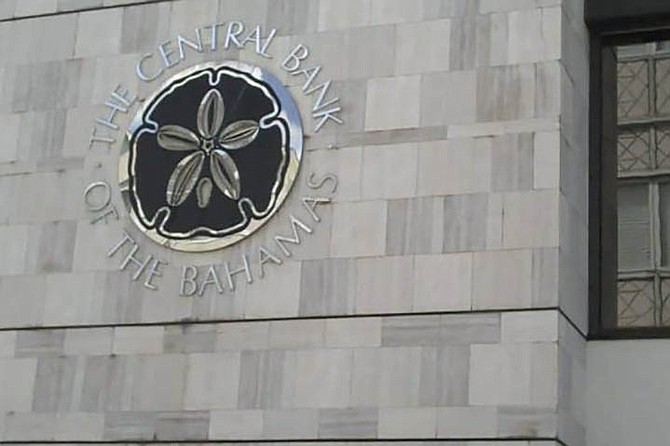By NEIL HARTNELL
Tribune Business Editor
nhartnell@tribunemedia.net
“Cripplingly expensive” business interruption cover, and “local” bank managers allowing borrowers to only protect their loan rather than property value, were key weaknesses exposed by Hurricane Dorian.
The Central Bank, in its review of the “lessons” learned for financial stability from the category five storm, said Bahamian practices on insuring business and personal cash flows against catastrophic economic damage were “rudimentary” at best compared to the much-stronger approach to protecting physical properties.
Analysing the Bahamian banking industry’s experience with post-Dorian insurance claims, it said: “Current lending policies do not require commercial borrowers to purchase business interruption insurance, or require personal borrowers to purchase income interruption insurance.
“The former is often unavailable or cripplingly expensive; the latter does not, to our knowledge, exist in any reasonable form. It would be fair to assert that Bahamian lending practice on insuring buildings is sound, but practices on insuring business or personal cash flows are rudimentary.”
While the commercial banking industry “does practice a form of macro self-insurance” through the loan repayment deferrals implemented post-Dorian and for the COVID-19 pandemic, the Central Bank said the category five storm had exposed other weaknesses when it came to ensuring loan security was properly protected by insurance.
“In a few instances, local managers allowed borrowers to insure for the loan amount, rather than the full value of the insured building,” the regulator added. “Such an approach does not work, as insurance companies will pay only a proportion of the losses in such cases.
“Even if this proportion covers a residual loan amount, it leaves the borrower unable to rebuild, and thus in a more general disaster weakens the entire community’s economic recovery capacity. There were some cases where insured buildings did not meet relevant building codes for storm resistance, and this has complicated insurance recoveries.
“In other instances, buildings were not in good repair before Dorian, which also complicates insurance recoveries and (in need) collateral realisation,” the Central Bank continued. “There were some cases where properties became under-insured with the passage of time, as the original valuations were not updated for several years.
“There were some instances where non-building assets (such as docks, marinas, and equipment) were pledged as a material part of the collateral package, but were not insured.”
Still, the Central Bank said Bahamian commercial banks suffered “minimal” unexpected losses due to insurance not being in place, or claims not being paid, as a result of Dorian. Some, though, found that their monitoring of borrowers had failed to deal with lapsed coverage of pledged collateral assets quickly enough.
“In addition, some banks do not monitor insurance coverage on low value loans on the grounds that the operational cost of this monitoring outweighs the benefits,” the regulator continued, adding that “a collective approach” from the banking and insurance industries “would likely reduce costs and increase compliance”. It added that it planned to work with the Insurance Commission on addressing this.
Elsewhere, the Central Bank pledged that “from this year” all Bahamians will be able to make and receive payments via their mobile phones, or a smart card, thanks to the roll-out of the Bahamian digital dollar via Project Sand Dollar.
It added that post-Dorian experience, when the mobile phone service was restored in weeks, showed that the transition to digital financial services was vital to improving the financial system’s resilience to catastrophes.
“The idea here is that any Bahamian will from this year, and much more so in the next few years, be able to make and receive all payments on his or her mobile phone, or on a smart card,” the Central Bank said. “Project Sand Dollar generates many benefits, but the Dorian aftermath demonstrated one major benefit: Rapid payments system restoration after a disaster.
“On Abaco and to a lesser extent, Grand Bahama, local banking services closed as the branches and ATMs were destroyed or rendered non-functional. Restoring these physical assets required weeks to months, and in some cases are not yet in place.
“Mobile phone coverage, by contrast, was generally restored with a few days after Dorian. Sand Dollar’s mobile phone functionality will mean that the financial recovery aspects of a hurricane can progress more quickly and more safely than would otherwise be the case. To take one example: An insurance claim can be paid via Sand Dollar, even if the insured and the insurer lack access to a bank.”
The Central Bank added that the COVID-19 crisis had further highlighted two more benefits from digital or online banking, as it eliminates physical queues at bank branches and spurs the transition from “high contact to contactless payments”.
“In summary, the Central Bank intends not only to require supervised financial institutions to better storm-proof themselves, but is taking steps to storm-proof itself and to facilitate a much more disaster-resilient retail payments system,” it added.





Comments
tribanon 5 years, 7 months ago
Outrageous insurance premiums, front-end and annual lender fees, legal costs, etc. etc., not to mention ridiculously high interest rates, all add way too much to the total cost of borrowing to fund major projects of any kind these days.
The_Oracle 5 years, 7 months ago
And terrible payout practices. Added costs to further diminish the economy. We seem to want to follow all the first world norms but keep both feet firmly planted in the 3rd world. Simple code compliances would be a good start. Zoning compliances. Construction Code compliance. The Banks have self preservation well in hand, the Insurance companies know how to deny and stall claims. Our Economy is in the "polite pillaging" stage but moving forward rapidly.
bogart 5 years, 7 months ago
The cost of the businesses having to protect in more ways costing them scarce, limited funds will pass on to the customers plus businesses adding a lil extra same time to customer. The poor gets poorer. Regressive VAT to majority poor just hurts more.
Sign in to comment
OpenID